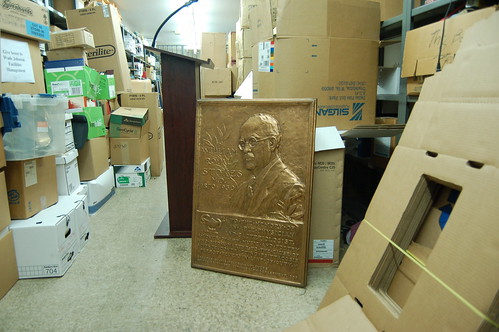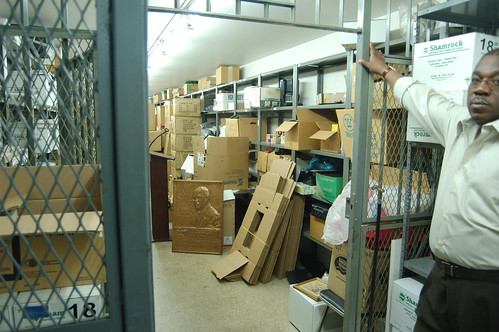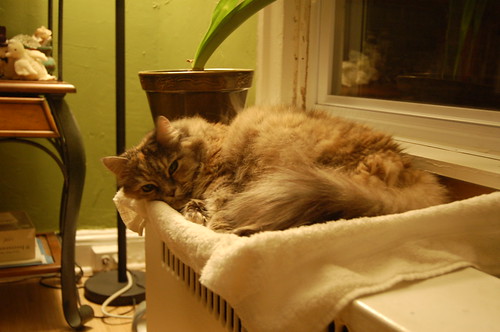Tuesday, 0835 – I am sitting in my brother’s Ford Taurus on Frisby Street, at the 33rd Street stoplight. Three helicopters hover in a tight group in the direction of downtown. This can’t be a good sign, I think. Later research suggests they might have been hovering over a rowhouse fire near Greenmount Cemetery in which 6 people died sometime between 7 and 8 a.m. Three of the dead were children. At least 13 people lived in the house, according to the Sun, including a boy in a wheelchair. One woman survived by jumping from a second-story window. Just another example of why being born poor matters, makes it less likely that you’ll live a long life. I’m terrified of being burned and can’t help but think that the children who died in this fire may have been luckier than some of the survivors, but that’s easy to say. There’s something about being alive, no matter in what condition, that tends to make you want to stay that way. Or, as Joker put it in Full Metal Jacket:
“The dead know only one thing. It is better to be alive.”
I spent the morning running my Filemaker scripts: find the matching records, save a copy, delete the unneeded records. Wash, rinse, repeat. Twelve times over. Aside from time spent entering and double-checking multi-layered search requests, I estimate that I spent a good hour or hour and a half of the morning watching a little blue progress bar creep across the screen, over and over, my computer too occupied with this task to handle anything else except its periodic automatic email checks. My computer seems to prioritize email checking over everything else, the whole machine freezing, ignoring key strokes even in other applications, waiting, almost straining as if against some sort of digital constipation, before – ah! – release: the “waterfall” new-messages sound, the bold-face message subjects stacking up in my inbox like the lumps of coal they are. (There’s hardly ever anything worth opening: 90 percent of my email consists of the same dozen or so forwards per day, sent along by multiple parties with “FYI” in the subject.)
But I eventually tamed my database and was at the point where I could move on to analysis. I was just updating my documentation (a description of which searches constituted each of the data subsets I’d been making) when Microsoft Word started doing that fun thing where it won’t let me make some change without freezing and crashing; in other words, the document had become corrupted. I recently learned the trick of saving a wonky Word document in rich text format (.rtf) instead of as a Word document (.doc), but apparently you need to do this while you can still open the document without the program instantly freezing, and I waited too long. It is such a deflating moment when you realize that a Word document you’ve been working on is now just digital trash. You come to work, proud to have licked one problem, ready – eager, even – to roll from one task to the next and get things done, only to find yourself set back by an hour or two as you retype a document from memory and rough notes. Fortunately it was a mere 14-pager, and mostly tables at that. In the early spring, I started having this problem with that 140-page policy report I’ve mentioned. That’s when I researched the .doc to .rtf conversion, which worked beautifully. I’m not sure if there is any reason to save a document as .doc at this point, come to think of it: RTF keeps your formatting, your tables, your styles (which, involving macros in the .doc format, are often the source of the problem). I shudder to think of how that could have turned out.
Ah, Microsoft. Not only do you leave our computers with gaping security holes but you don’t even work. There’s the power of the free market for you: I guess we all “want” substandard, confusing, poorly made trash on our computers. If only some other program were as universal, I’d move along in a second. Then there would be only one way Microsoft could keep me: a feature where a Microsoft engineer (preferably an important one, the one who made all the stupid decisions in developing Word) is kept tied to a chair, and, with a toolbar button, users can shock him at will. Or maybe just deliver a blow with a big boxing glove on a spring. Come to think of it, the button would need to be on my keyboard or external to the computer, so that I could use it during the long, frequent periods when I’m restarting the machine after Word “quits unexpectedly” and the whole thing freezes up.
After work I drove to Towson Town Center, a mall on the northern edge of the city. I had it in mind to pick up a new pair of jeans for the New Orleans trip. The drive was not so bad. I was expecting terrible traffic but it was moving, if heavy, and the drivers displayed no more than the default mild surliness. At the mall, I tried the Gap first, which I hope you realize takes some guts to admit. Yes, I have for the last few years usually purchased my jeans at the Gap. A few years back I discovered their “standard” fit jeans, which seemed to be just the ticket for my particular body shape, and I’ve probably bought four or five pairs. This is not to say that I always got exactly the same pair of jeans, because, even from one season to the next, the “standard” seemed to fluctuate, the cuffs widening, the “relaxed”-ness of the fit tending more or less toward bagginess, a definition of the word “standard” with which I’m not familiar. I guess they meant “standard” for the next twenty minutes. Still, on average, they did the trick. But there is no “standard” anymore. Standing in the Gap, the stench of dye and sweatshops washing over me, I couldn’t find “standard” fit (and I couldn’t locate it on their web site just now, either); the closest seemed to be “straight” (website: “easily pulls off the belt and blazer look”; despite that not infrequently being my look, it is somehow shaming to see it described on the Gap web site) but I never even made it to the fitting room to find out because the colors on offer were so hideous. I assume that some of the variations on “faded” jeans that are on offer these days are actually created with the use of faded-looking dyes; these particular pants seemed to have had the dye painted on while the jeans were crumpled up in a ball, so that the variations and gradations in the dye looked like wrinkles. Suggested tag line: “Gap straight fit, for when you want to look like you found a pair of jeans wadded in the back corner of your closet.” Disgusted, I walked out. How gullible do they think we are?
Pretty gullible, I guess. Isn’t that what the fashion industry depends on? Just look at women’s clothes, especially the extra-long, pointy shoes and those “formal” shorts that appeared sometime in the last year. I wonder if the women who wear these realize that they don’t make you look good as much as they make you look like someone who does what she’s told by strangers who make magazines – someone who’s willing to go along with anything. This is a quality some people probably find attractive, but probably not the kind of people you’d actually want to meet.
I walked down to the Macy’s and immediately saw a nice-looking pair of jeans in the Polo display, only to turn over the price tag and read “$115.” Not that gullible. On to the Levi’s section with its fine distinctions: straight fit? tapered leg or no? sit at waist, or just below? Actually, relatively few of these choices were available, they were just frustratingly implied by the label copy. I picked out a couple of pairs and headed for the dressing rooms. As I entered the hallway, a young man appeared in stocking feet to model a pair of plaid shorts for a young woman sitting in a chair near the entryway.
“Omigod!” she said. “You love them, don’t you?”
“You do, too, right?” he asked.
“They are the perfect length!” she said. “I do I love them. You are going to rock those!”
The Levi’s didn’t work out, and neither did the Calvin Kleins I tried next, and I ended up leaving empty-handed after a moping stroll through the Dockers section. A Macy’s credit card poster asked me “why not have it all?” Have what? A bunch of bizarre, low-quality crap, priced as if it were woven from threads of gold? It’s difficult to see the power of the market here, too. You can’t tell me it’s everyone’s first choice to pay out the nose for the privilege of dressing in clown clothes. Or maybe I’ve just outgrown jeans or maybe clothes shopping in general. I’m tired of never being able to find the same style of pants twice. Sometimes I think it would be nice to have a tailor who knew my basic look, the silhouette that suits me, and simply fabricated my clothes accordingly. “Luigi, I need a new pair of chinos. Do you need to measure me?” “No, no, I remember your size. I’ll send a boy around with them Tuesday.”
I was all set to leave the mall when I remembered that I wanted to buy a CD. I prefer to make such purchases at Soundgarden in Fells Point, but since that store was a good half hour’s drive from the mall and I still had to pack for New Orleans, I decided to duck into the mall music store. I was too hungry to concentrate, though, and stopped first for a slice of pizza in the food court, surrounded by tween girls in flip-flops and pink skirts and also by nascent gang members showing off their shoulder tattoos and back acne in white tanktop undershirts (I’d call them “wifebeaters” except I’m wearing one right now). My belly full, I checked a directory for the location of the music store. Would it be under “electronics and entertainment”? “Specialty stores?” Nothing jumped out at me, but I’m not necessarily current on the names of chain music stores. I asked a sullen young woman marooned in the Sprint cell phone kiosk.
“This mall doesn’t have a music store,” she said. I was surprised and must have looked it. “I know, it’s retarded, isn’t it?” she commiserated.
So forget the music store, I thought. I drove south on York to Greenmount and cut over toward my house through the side streets, since you can’t turn left at 33rd. This brought me through the crowd that always takes over a portion of a street just around the corner from my house, clustered around a portable basketball hoop that someone in the end house sets up at the head of the alley, turning the street into a half court. When I remember, I try not to use that street, but last night there I was and there they were and it was like they weren’t going to get out of my way at all. As I squeezed through the barely parted crowd, there was a loud thump against the side of the car, like the sound a basketball would make, accompanied by laughter. None of the usual, if disingenuous, apologies. (Such as: “sorry for leaving our drinks on your car,” i.e., “now that you saw that I left my drink on your car, I know that I’m required by vaguely apprehended rules of etiquette to apologize, which I will do in such a grinning, ingratiating manner that my friends can tell I don’t mean it and am just manipulating you.”) Just naked mockery and disrespect. These are the moments when I can’t wait to get out of this city.
Let’s just say I was glad to be home, then, which will suggest how frustrated I immediately felt upon realizing that I had forgotten to pick up the one item on my shopping list that wasn’t at all optional, cat food. Her Highness Miss Zuzu has recently gotten into the habit of turning up her nose at her food about halfway into each bag. These are medium sized, 50-ounce bags, and I pour the food into an airtight plastic container anyway, so it’s not like it’s sitting around forever in the open air to get stale. Last time she did this, about a month ago, I switched from Purina Naturals to Purina Natural Blends (Salmon and Brown Rice Formula, which sounds good even to me) and this seemed to fix the problem. But this week neither one seems to be good enough for her anymore. The temptation is just to let her starve, but then, it’s not like she asked to live indoors and be fed little processed pellets of sawdust and slaughterhouse floor-sweepings. I walked to the Giant. In the pet food aisle, I saw that there is a yet smaller bag of cat food, the resealable 16 ouncer. On the chance that the problem is staleness (hard to believe, what with that airtight container, but maybe the food smell just evaporates after a while) I decided to go with this smaller size, and on the chance that Zuzu will not like one of them, I got three different flavors. Still Purina, but now it’s Fancy Feast (crap, it’s not “natural,” which I just remembered we switched to in case the dyes in the “unnatural” varieties were responsible for a bad run of puking we were going through; oh, well). Bag copy: “Some say cats are finicky. We believe cats simply have high expectations for each meal to be spectacular. And why shouldn’t they?” Finicky. Yeah. These are the animals that drink the drainage from a can of tuna fish, or dig in a box of their own excrement before licking their paws and rubbing it all over their bodies. Then there’s the puking. Such clean animals. Such High Standards.
Although I will say they’re lucky they don’t ever have to buy pants.








